Seriously? Nobody Here Has Reviewed Alien?
Alien (20th Century Fox, May 1979). Directed by Ridley Scott, screenplay by Dan O’Bannon
I am constantly making Alien/Aliens references to my wife and she is constantly reminding me that she has not, in fact, ever seen any of the Alien movies except Prometheus (damn the luck). Having just finished up the 1979 cadre of sci-fi magazines, and noting that many of them had references to the movie Alien, it was finally time to fix this situation — at least with Alien, Aliens, and that part of Alien 3 where half of Lance Henriksen steals the whole movie.
So, we finally watched Alien. And it appears that nobody at Black Gate has ever reviewed it. In fact, it is such a pop culture touchstone that most people know the story without, well, having seen the story. I’m going to start this review by coming out swinging: Alien is one of those movies, kind of like Blade Runner (another Ridley Scott film) – a movie that is far better than it deserves to be, a movie whose every misstep manages to ‘fall up’ as it were.
How does it pull off that trick? Luck, mostly, and good cinematography goes a long way, and good actors push it past the finish line. In the world of writing, one of the greatest truths is that you want to tell enough, but not too much — you want the reader to fill in some of the blanks.
Movies that fall up often manage to do that. There is a gap, but your brain kinda fills it in, so you are not drawn out of the experience, and thus, like a great radio play, you unconsciously become invested in it. Alien does that quite a bit, and often by happy accident.
The movie looks really good — it still looks really good. Honestly, the main thing that dates it is the various cathode-ray-tube screens. One could argue that the film is mostly all in the dark, but I don’t really think that is a valid argument. There are shades of darkness — the Engineer ship and the chamber beneath it should be dark. There are parts of the Nostromo — the living quarters — that are very well lit (and the Mother computer is like a well-lit womb), and then the various other sections are different shades of dark.
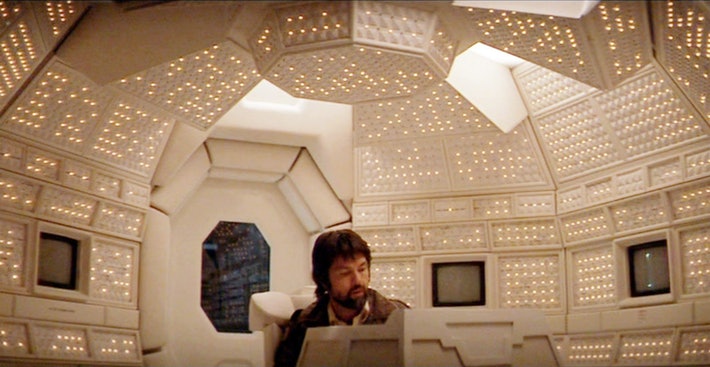
Speaking of cathode-ray tubes, the movie’s view of computer really has a very late 70’s vibe. There are computers everywhere on the Nostromo, but the mother computer is given center stage. Which is weird because the mother computer does not seem to do much. It wakes up the crew (although doesn’t tell them why — the captain (Dallas) has to swipe his card, get another card, and then go into the computer room/temple to find out), nor does it land the smaller craft — that’s all done by the onboard computer and the crew.
The movie is also helped by having a very good set of actors who bring the characters to life. The characters, in turn, really sell the world they exist in. That’s a huge part of the ‘falling up’. The good look of the movie manage to keep the viewer interested for its first five or ten minutes, and then the baton is passed to the characters. The movie doesn’t have a main character for most of the first act, something that I think it borrows from the ‘horror’ side of the ‘sci-fi/horror’ equation. To the viewer, the characters start off as equals as far as our attachments go.
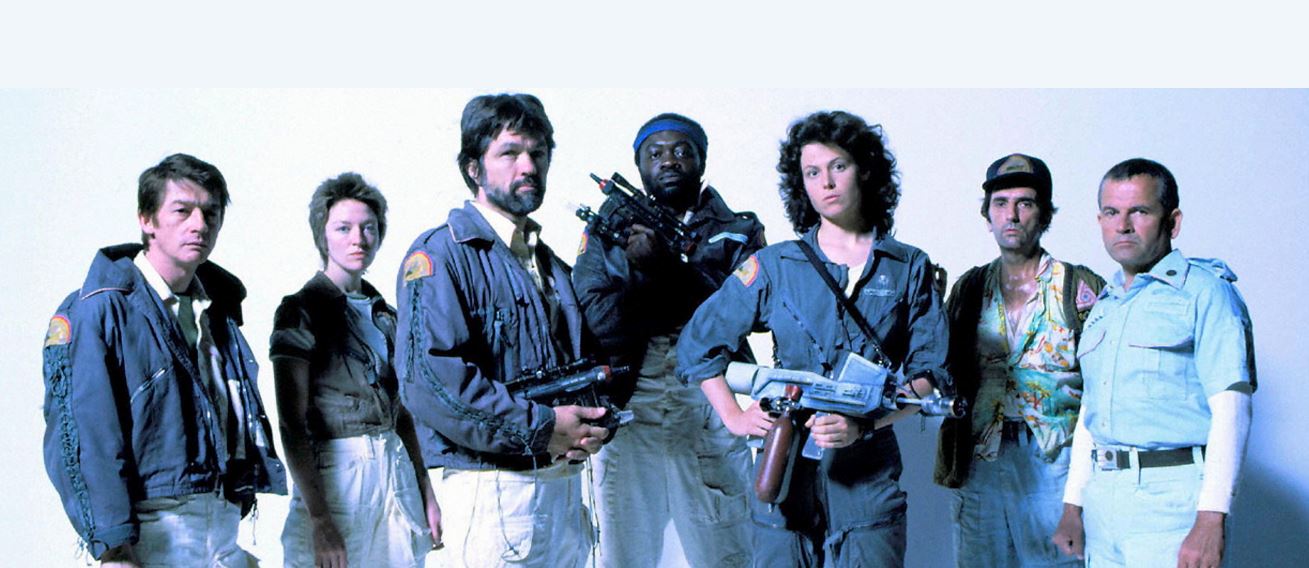
In fact, this might be a good time to point out (as have many others) that horror movies and science-fiction movies have a lot overlap. The standard haunted-house tropes of horror map pretty well, although not 100%, to some of the standard tropes of exploration-sci-fi. Alien has most of the beats of a horror movie, summarized below:
Everything starts off normal enough, then something goes wrong, Dammit, Janet, let’s just go to the spooky house on the hill, explore the spooky house on the hill, not just start walking ‘til dawn, and discover just what makes it spooky.
The crew are awakened, assume they are one place, but discover they are in another (“Everything starts normal enough, then something goes wrong”). They have to go to the planetoid and explore the derelict spaceship (Dammit, Janet, let’s go through the spooky woods to the spooky house), they let the face-hugger into the spaceship (not just start walking ‘til dawn), and then fight the xenomorph as it runs amok (discover just what makes the house spooky).
Thus, borrowing from the horror genre, for the first three-fourths of the movie there really isn’t a main character. Early on, Ripley isn’t much of anybody. Dallas is the Captain, Kane is the explorer, and Parker and Brett both have fairly strong personalities compared to the rest of the crew. Lambert is the navigator and Ash is the scientist — both crucial roles in SF.
Ripley is kind a third in command, company scold, honestly. It is only when she starts quoting quarantine protocol (which is what? 45 minutes in?) that she shifts into higher gear. Even then, it is just a shift, not a complete lane-change.
Discussion of the characters has to take a diversion to bring up Ash; although the movie advertises the xenomorph as the enemy, it really is Ash (and one might argue The Company operating through Ash) that ensures the rest of the crew can’t do the very simple things they need to do to keep the xenomorph at bay. Ash ensures that the small disaster they find themselves in morphs into a huge disaster.
The disaster grows as the crew tries to find and capture or destroy the xenomorph. Poking around in the dark, they lose the engineer Brett and Captain Dallas to the creature. Ripley’s move to main character status is a strange ritual, with Kane and Dallas both dead, she is the senior officer and thus has access to the mother computer temple, where she manages to get access to The Company’s message to Ash, which states that he is to bring back a xenomorph specimen and the rest of the crew is expendable.
That leads to the scene where Ash tries to murder Ripley is by far the most frightening and disturbing scene of the movie. I mean, it is bizarre. And Bilbo Baggins Ian Holmes totally crushes it. Android Ash is awful at hiding his intention. He starts twitching, and focusing on random parts in the room, and sweatin’ Yoplait.
He is also, unlike the xenomorph, awful at murder. Does he use his robotic strength to break Ripley’s neck, or crush her throat? No! He tries, it appears, to strangle her with a rolled up magazine. How would that even work? He was going to shove that magazine so far down her throat it blocked the her trachea and she would asphyxiate? Madness! Maaaaaadness!

The weirdness of that scene only begins with the actual murder attempt. Because again, it is the reaction of the crew/actors to Android Ash that really sells it. We are easily an hour plus into the film when the audience is even introduced to the idea of robots. While the (remaining) crew is alarmed that there is a robot in their midst — they do not seem freaked out by robots existing at all.
I get a feeling that there is 5 seconds of dialogue missing, where Parker and Brett are bitching about their lack of shares and one says to the other “Be careful, they can replace us with robots” and the other says “Robots are good people. I dated one for a while.” Or Dallas and Ash saying much the same thing, “If those two don’t start bitching The Company’s going to replace them with robots.” Then Ash says “Robots give me the creeps.”
See what I mean about the viewer filling in the blanks? I’m filling in the blanks with made-up dialogue. The double-weird of the robot is that Ridley Scott clearly told the special effects department that he wanted a robot that will never in a million years make anybody think about C3PO or Robbie the Robot or anything like that. The special effects team delivers! Ash is this weird bio-electrical thing full of what looks like bladderworts and crème fraiche.
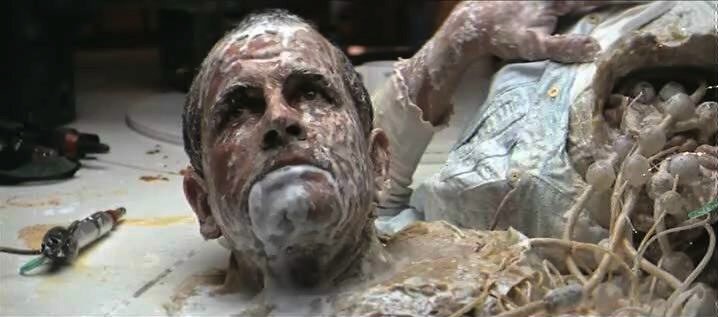
Then the movie follows that up by having the crew reactivate Ash’s his head so he can talk to them — which he does. Ash doesn’t take his or the company’s secrets to the grave, he just tells them the score. Another thing that makes little sense but manages to work.
The Ash scenes are by far the high point of creepy, weird, and scary of the movie. Again, I think this wasn’t planned, it was just luck. It is this weird mad set of scenes that the viewer rides through to the kinda tame actual ending of the movie.
As mentioned, dealing with the xenomorph is so difficult that Ridley Scott really wrote himself into a corner. The enemy in the third act of the movie is less the xenomorph and more the cold equations that mandate only two people can be in cryosleep in the escape pod, and thus they have to pack it with enough food so that a third or fourth person can wait it out for, the six weeks it will take to get back to civilization and rescue. That’s the only reason they are still fumbling around in the dark in the ship.
The xenomorph, in a surprise turn, kills Parker and Lambert very sloooowly. Once they are out of the way, Ripley has a sleep pod to herself and it’s all good, so she sets the self-destruct on the Nostromo. But after discovering the alien somewhere between herself and the escape pod the new enemy is trying to shut down the self-destruct timer itself. Literally a ticking time-bomb situation!
Again, another weird 70s computer/sci-fi thing, that even though she manages to shut down the self-destruct with like under 10 seconds to spare, the ship is still going to self-destruct. Or is the Mother computer allowing it to self-destruct to destroy any evidence of The Company’s maleficence? Who knows?
Ripley has to rush back to the escape pod and the new enemy is the countdown to actual detonation of the Nostromo and the sub-enemy is the xenomorph. Of course, the xenomorph is hiding in the escape pod and after all the killing and eating and busting of heads, and tail impaling, it seems bizarrely sedate. Like it was settling in for a long nap. Honestly, at that point it doesn’t seem to want much of anything to do with Ripley, it reaches out to grab her but it really seems half-hearted.
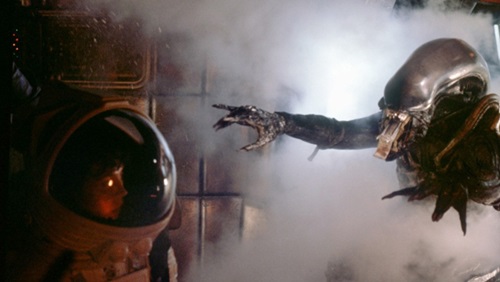
The xenomorph doesn’t squirm out of the locker (or whatever it’s in) to pursuer Ripley, it’s only when she sprays it with liquified air that it climbs out. Even then, it doesn’t seem to be that interested in her (although, again, my mind filling in the gaps, maybe it couldn’t detect her once she was wearing a spacesuit — although that certainly didn’t stop the face-hugger from getting to poor Kane).
So, it is a very weird finale, it isn’t an action scene — because a lot of action is off the table due to the acid blood. It is a psychologically tense scene, with Ripley trying to move very slowly and carefully to get the tools she needs to deal with the xenomorph, without spooking it into attacking her.
Of course, my mind also backfills things from the franchise’s future — that the xenomorph was about to undergo a final molt into the queen-form and was trying to find as secluded a place as possible (although, the Nostromo seems huge, there are surely plenty of places where it could do this).
There is also the weird final of the finale scene, when the engines fire up, and there is obviously water dripping down on the camera… is that like the alien blood? Or is that a botched special effect? Or is it like the reaction of the engine is hydrogen and oxygen making water or something? Who can say! But what I can say is that Alien manages to snatch victory out of the double-jaws of defeat again and again!
Adrian Simmons is an editor for Heroic Fantasy Quarterly, check out their Best-of Volume 3 Anthology, or support them on Patreon!
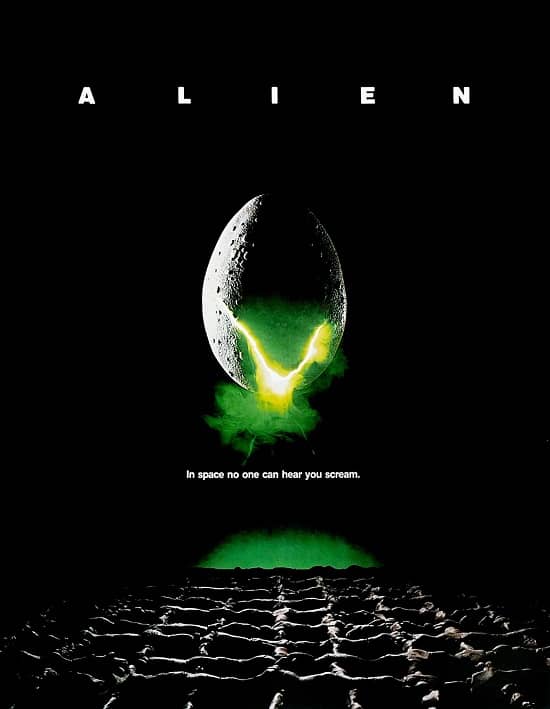
Excellent. I’ve seen Alien 3 or 4 times, and I overlooked several of the nuances you bring up. Nicely done.
Thanks! I think I’ve seen it three times, and once I think I saw a bit of it on a drive-in theater on its open weekend.
I haven’t seen it in quite a while. It’s a “cornerstone,” a “classic,” and all that blah blah, and still on balance a good movie. But it does highlight Scott’s preference for style over substance, his concern with giving his films a killer look to the neglect of everything else…and that came back to bite him (and us!) more than once.
Indeed!
He does make movies that look awesome, but looks aren’t everything!
I haven’t seen it since it came out – that was ’79, in a small cinema in a fishing village in West Cork with my cousin.* I’d already read the novelisation by Alan Dean Foster, so basically knew every twist and turn of the movie, but enjoyed it nonetheless.
Weirdly enough, I came across another blog about it recently, and the blogger made the same point as you – how the parts were underwritten but that a top-notch cast managed to flesh them out. Some of the best dialogue between Hurt and Kotto was improvised. Skerrit kept his voice pitched artificially low to play against the fact that he was giving orders – it infuriated Sigourney Weaver but she said that (in retrospect) it was very effective. And so on and so forth.
I think Ridley Scott is a talented director, but luck is a huge part of why a film works. And in fairness, Scott has produced his fair share of turkeys.
* although I’ve seen the sequel four or five times. Go figure.
I read about half of the Alan Dean Foster book in high school in like ’88. I don’t even remember where I found it…
I wonder if some of Scott’s successful films hinges on the actors doing some of the heavy lifting? I know that Lance Henriksen said that he had a lot of freedom in how he got to play Bishop (in ALIENS)– so at least at that point, the actors could flesh things out.
I agree that luck is a pretty big part of why a film works. Sometimes timing is everything. I think ALIEN might have got some of that, too.
Most of the movie’s cast have carried a film on their own at one point or another. They were WAY better than they needed to be. There’s an old saying, ‘good acting is good casting’. Hitchcock had no interest in actors either, but maybe he and Ridley were good at getting the right person for the right part?
Ok in defence of Alien, back in the day it was a very scary film. And back then that’s why people went to see it. Didn’t Ash use the magazine to kill like the facehuggers? He was haywire so not acting logically. I dunno. Am I the only one to admit that this film scared me?
Well, what I’m saying is that Ash’s sudden non-logical/haywire behavior is one of the most disturbing and frightening parts of the movie. On the face-hugger, I think it just died shortly after implanting an egg in Kane, Ash kind of poked at it, cut it once (big mistake), but that’s it.
I wasn’t all that scared of the movie since by the time I actually saw it, I knew what was coming, plus I saw it on T.V. so I’m sure it was a toned-down version. Having seen that, when I re-watched it through the **cough cough decades** it was creepy, but not scary.
I think the American version of “The Ring” was the last time a movie scared the bejeezus out of me.
Ash wasn’t trying to kill Ripley with the magazine. He was using it to force a pill down her throat to sedate her. Once she was under, he was going to let the alien have a go at her, make some more aliens.
But the way I saw the film in London 1979